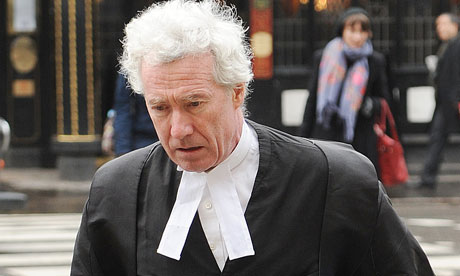
At a time when the UK is attacking the legitimacy of the highest court in Europe, the European Court of Human Rights. One of the accusations being that some of the judges lack prior judicial experience. The UK appoints a lawyer with no prior judicial experience to the highest court in the UK, the United Kingdom Supreme Court!
Why?
It exposes hypocrisy of the highest order. It means that the UK's criticism of the ECtHR is unjustified. It leaves a taste in the mouth that this is a political appointment. Is the UK so short of judges with the necessary judicial experience for the UKSC that it has to appoint a lawyer who has no judicial experience whatsoever over qualified judges?

4 comments:
As a lawyer, Sumption is possibly without equal. He does have "some" judicial experience but it pales into insignificance at the side of Lord Justice Wilson - (the other appointee).
The other long-standing practice which has been ignored is to allow him to complete a very lucrative case before taking up the post. However, I doubt that he could properly sit on an appeal in any case in which he has been counsel. We shall see.
My main criticism is the UK attacking the ECtHR for some judges lacking prior judicial experience. So, this to me is pure hypocrisy.
When my case for the prisoners votes was at the High Court, the same judge did both first instance and the appeal!
To sit on an appeal from your own decision is a definite NO NO in English law.
That's what I was led to believe, until it happened to me and my point was rejected.
What is being missed in Hirst v UK (No2) is that Kennedy LJ, showed deference to Parliament.
"35. In 1992, the Canadian Supreme Court unanimously struck down a
legislative provision barring all prisoners from voting (Sauvé v. Canada (No. 1) [1992] 2 SCR 438). Amendments were introduced limiting the ban to prisoners serving a sentence of two years or more. The Federal Court of Appeal upheld the provision. However, following the decision of the
Divisional Court in the present case, the Supreme Court on 31 October 2002 in Sauvé v. the Attorney General of Canada (No. 2) held by five votes to four that section 51(e) of the Canada Elections Act 1985, which denied the right to vote to every person imprisoned in a correctional institution serving a sentence of two years or more, was unconstitutional as infringing Articles 1 and 3 of the Canadian Charter of Rights and Freedoms:
“1. The Canadian Charter of Rights and Freedoms guarantees the rights and freedoms set out in it subject only to such reasonable limits prescribed by law as can be demonstrably justified in a free and democratic society.”
“3. Every citizen of Canada has the right to vote in an election of members of the House of Commons or of a legislative assembly and to be qualified for membership
therein.”
36. The majority opinion given by McLachlin C.J. considered that the
right to vote was fundamental to their democracy and the rule of law and could not be lightly set aside. Limits on it required not deference, but careful examination.
Even Canada rejected Kennedy LJ's, reasoning of deference.
Then there is the subsidiarity principle in international and European law which is in conflict with Sovereignty of Parliament.
Ken Clarke tries to dismiss it as not an important case for the ECtHR to bother itself with. But, it is a leading case and the fall out is proving it is important.
Post a Comment